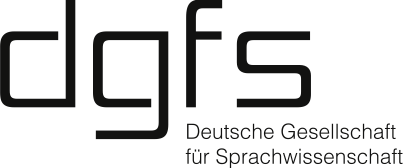AG 7: Universal biases on phonological acquisition and processing
AG-Koordination
Dinah Baer-Henney (U Düsseldorf) & Natalie Boll-Avetisyan (U Potsdam)
Abstract
Typological research indicates that many languages share specific patterns regarding their phoneme inventories, syllable structures, phonotactics and prosodic systems. A recurrent topic in acquisition research is the question of whether typologically well-attested patterns reflect universal biases on phonological acquisition and/or speech processing. This workshop aims at discussing the nature of these biases and to what extent they influence phonological acquisition and processing of L1 and L2 in children and adults.
There seems to be a strong consensus among researchers that phonological acquisition is guided by universal biases. Yet, the specific nature of these biases is unclear: are they functional or analytical, domain-general or domain-specific? What is it that makes some patterns, often called natural patterns, more easily accessible and learnable than others: Are they are innate or are they triggered by experience with language? In addition, it is debated whether there are time limits on the operating periods of biases (possibly reflecting difficulties in L2 phonological acquisition, i.e., a critical period), or whether they also influence L2 phonological acquisition. If they influence the L2, what happens when the L1 phonological system is in conflict with the L2? In addition, the question arises to what extent universal biases might be at work even during speech processing after acquisition is completed. These classical questions have recently received new attention and benefit from the revival of artificial language paradigms, which enable us to investigate language acquisition and processing likewise.
The goal of the workshop is to discuss effects of biases on L1 and early L2 phonological acquisition and their relation to age of acquisition from theoretical and empirical perspective. We aim to contribute to the current debate by assembling new insights to get a more concrete comprehension of the nature of universal biases. We invite contributions investigating monolingual and bilingual (L2) infant, child and adult phonological acquisition of segmental and suprasegmental structures in natural and artificial language learning. Contributions that may build a bridge between empirical findings and linguistic theory are particularly welcome.
Deadline: 31.8.2014
Programm
| 4.3.2015 | |||
| 14:00 | Dinah Baer-Henney (U Düsseldorf) & Natalie Boll-Avetisyan (U Potsdam) | ||
| Universal biases on phonological acquisition and processing: theoretical and methodological issues | |||
| 14:30 | Outi Bat-El (Tel-Aviv U) | ||
| The trochaic bias: nature or nurture? | |||
| 15:00 | Brigitta Keij & René Kager (U Utrecht) | ||
| The nature of the universal trochaic bias: Dutch-learning and Turkish-learning infants | |||
| 15:30 | Paul Olejarczuk & Vsevolod Kapatsinski (U of Oregon) | ||
| Learnability of weight-sensitive stress by English speaking adults | |||
| 16:00 | Pause | ||
| 16:30 | Christophe dos Santos, Laetitia de Almeida & Sandrine Ferré (U François-Rabelais, Tours) | ||
| The ease of labial first: Evidence from a non-word repetition task aimed for bilinguals | |||
| 17:00 | Anne Gwinner & Janet Grijzenhout (U Konstanz) | ||
| Universal biases in the realization of weak syllables: a production study with German and Italian-German children | |||
| 17:30 | Sharon Peperkamp (CNRS, Paris) | ||
| Phonological rule learning and consolidation after sleep | |||
| 5.3.2015 | |||
| 9:00 | Elliott Moreton (U of North Carolina) | ||
| The comparative study of inductive bias | |||
| 10:00 | Sophia Kao (Stony Brook University) | ||
| Phonological learning bias in tone retention | |||
| 10:30 | Jagoda Bruni, Daniel Duran & Grzegorz Dogil (U Stuttgart) | ||
| The role of social and functional biases in the investigation of the unintuitive voicing behavior | |||
| 11:00 | Pause | ||
| 11:30 | Job Schepens (Radboud U) & Florian Jäger (U of Rochester) | ||
| L2 phonological learning in adults: the role of language background, length of exposure, and age of acquisition | |||
| 12:00 | Kurzvorträge (s.u.) | ||
| 6.3.2015 | |||
| 11:30 | Adam Albright (MIT) & Youngah Do (Georgetown U) | ||
| The source of the paradigm uniformity preference | |||
| 12:00 | James White (U College London), Yun Jung Kim, Adam Chong & Megha Sundara (UCLA) | ||
| Phonetic similarity as a bias in infant phonological learning | |||
| 12:30 | Ocke-Schwen Bohn (Aarhus U) | ||
| An update on learners' universal bias favoring peripheral vowels in L1 and L2 acquisition | |||
| 13:00 | Jeannine Schwytay & Barbara Höhle (U Potsdam) | ||
| The consonant-vowel-asymmetry in early word learning of German | |||
| 13:30 | Sho Tsuji (1), Nienke Dijkstra (2), Titia Benders (2,3), Reiko Mazuka (1,4) & Paula Fikkert (2) (1: Riken BSI; 2: Radboud U, 3: U of Newcastle, 4: Duke U) | ||
| How universal is the special status of coronals in perception? A developmental, crosslinguistic perspective |
Abweichung vom ursprünglichen Plan
Das Poster von Brooks et al. wurde zurückgezogen. Statt der Postersession gab es drei Kurzvorträge:
- 12:00
Ewan Dunbar & Emmanuel Dupoux (Laboratoire de Sciences Cognitives et Psycholinguistique)
The typology of inventories: Non-trivial patterns without non-trivial bias - 12:20
Nadja Kerschhofer-Puhalo (U of Vienna)
Biases in non-native vowel identification - universal and/language specific difficulties and preferences
- 12:40
Christiane Ulbrich (U Marburg) , Phillip M. Alday (U Marburg), Johannes Knaus (U Calgary) & Richard Wiese (U Marburg)
Phonotactic principles in language processing

